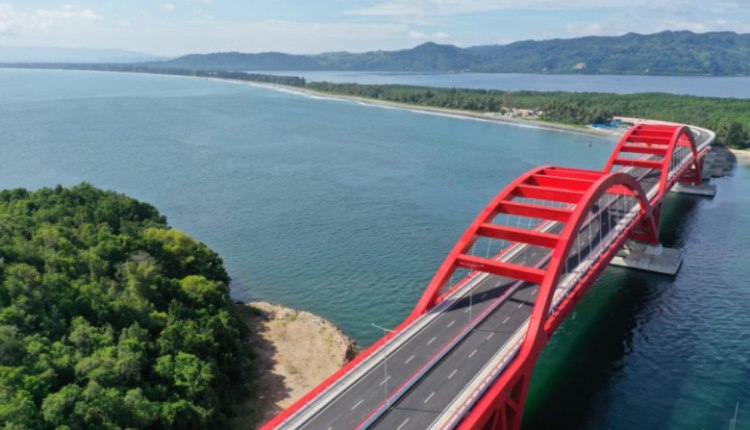The construction of the Trans Papua Wamena Section is a manifestation of the State’s commitment to the prosperity of OAP
By: Recky Rumbiak *)
Infrastructure development has become the Indonesian government’s main priority to strengthen connectivity between regions, reduce socio-economic disparities, spur national economic growth, and improve the welfare of Indigenous Papuans (OAP). One of the major projects currently underway is Trans Papua, a project that aims to connect various remote areas in Papua with roads that are suitable and accessible throughout the year. In particular, the construction of the Wamena section of the Trans Papua road is an important part of this project which reflects the government’s strong commitment to improving accessibility and welfare of the Papuan people.
The Wamena road section is an important part of the Trans Papua road network which is expected to open access to various remote areas around the Central Mountains. With this road, population mobility will increase, access to health and education services will become easier, and economic activity can grow faster. Apart from that, this road is also expected to facilitate the distribution of goods and services, which in turn will reduce price disparities between Papua and other regions in Indonesia.
The Ministry of Public Works and Public Housing will build the Memberamo-Elelim segment road, as part of Trans Papua. The national road project worth IDR 3.3 trillion is designed to connect the capital of the Papua Mountain Province, Wamena, with the capital of the Papua Province, Jayapura.
The project was built using a government and business entity (KPBU) cooperation scheme. The company that will build the road is PT Hutama Mambelim Trans Papua. The investment return scheme used is payment for service availability (availability payment) for a 15 year concession period until 2039. Minister of PUPR, Basuki Hadimuljono said that his party is confident that this road PPP (system) will soon be realized, so that the level of expensive goods and services in Wamena can be lowered.
Basuki said the road was 50.14 kilometers long and was part of the Jayapura-Wamena section. The scope of the project includes bridge construction, a motorized weighing unit, handling slopes and cliffs, as well as operation and maintenance during the service period.
The construction of the Trans Papua road, especially the Wamena section, is expected to provide various economic and social benefits for the Papuan people. One of the main benefits is increased accessibility and mobility. With proper roads, people can more easily travel to work, go to school or get health services. This will have a positive impact on their quality of life.
From an economic perspective, the Trans Papua road will open access to a wider market for local products. Communities in remote areas will find it easier to sell agricultural products, handicrafts and other products to larger markets, so that their income can increase. In addition, lower logistics costs will reduce price disparities between Papua and other regions, so that the prices of goods and services in Papua can become more affordable.
It is also hoped that this infrastructure development will attract investment to Papua. With good roads, investors will be more interested in opening businesses in Papua, both in the agricultural, tourism and other industrial sectors. This will create new jobs and improve the regional economy. Apart from that, road construction will also support the development of the tourism sector in Papua, which has great potential with its natural beauty and unique culture.
Previously, President Joko Widodo held a limited meeting regarding accelerating the development of Papua with a number of ministers from the Advanced Indonesia Cabinet at the Merdeka Palace, Jakarta on May 8. The meeting agreed that there was a need to increase the rate of quality of education, health and security in Papua.
Minister of National Development Planning, Suharso Monoarfa, said that his party would accelerate and improve welfare programs in Papua. Suharso also said that his party would take all welfare approaches, including education and health, the budget for which had been included in the relevant ministries and institutions.
This government commitment is not only visible from the large budget allocation for this project, but also from efforts to involve various parties in the development process. The government is working with various institutions, both at the national and regional levels, to ensure that this project can run smoothly and provide maximum benefits for the community. Apart from that, the government is also trying to involve local communities in the development process, so that they feel ownership and support of this project.
To ensure that this project can be completed on time and with good quality, the government carries out strict supervision over its implementation. Each stage of development is carefully monitored, and various problems that arise in the field are handled quickly and precisely. This shows the government’s seriousness in completing this project according to the plans that have been set.
Apart from that, the government is also committed to continuing to improve the quality of infrastructure in Papua after the Trans Papua road is completed. Road maintenance and construction of other supporting infrastructure, such as bridges, ports and airports, will continue to be carried out to ensure that Papua can continue to develop and its people can enjoy the results of this development in the long term.
)* The writer is the Editor of Berjaya Papua Youth Media
